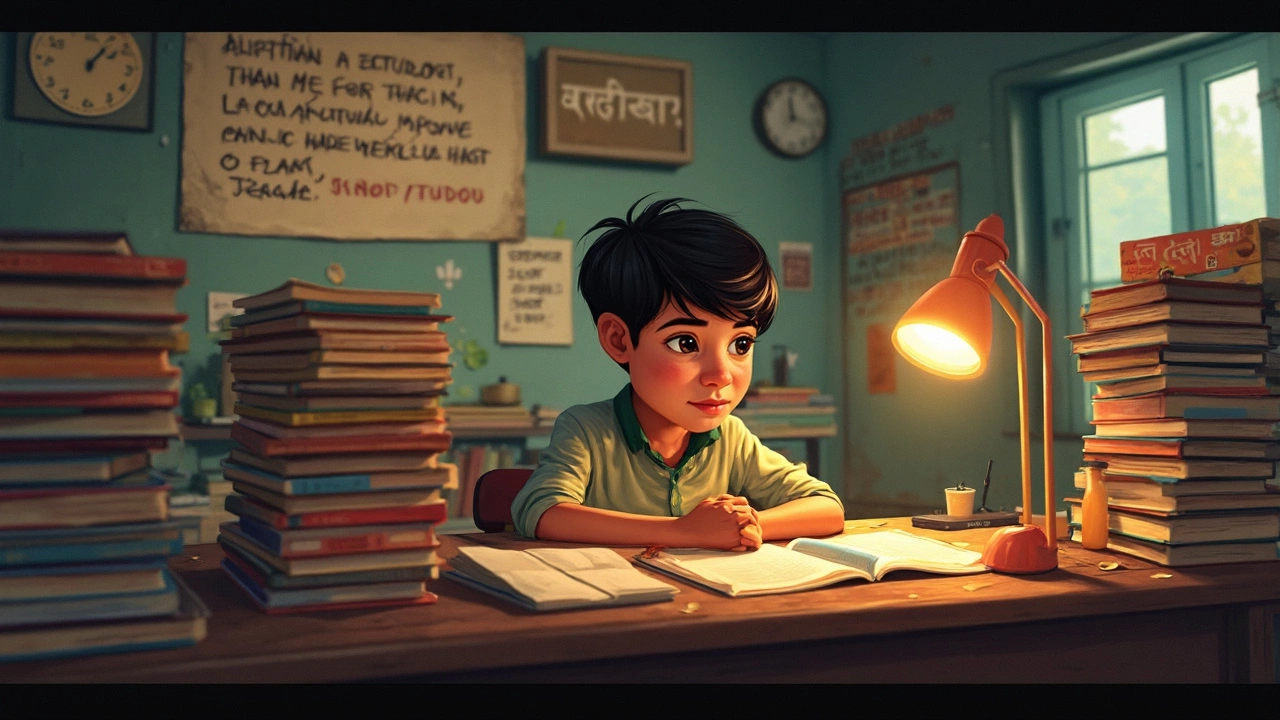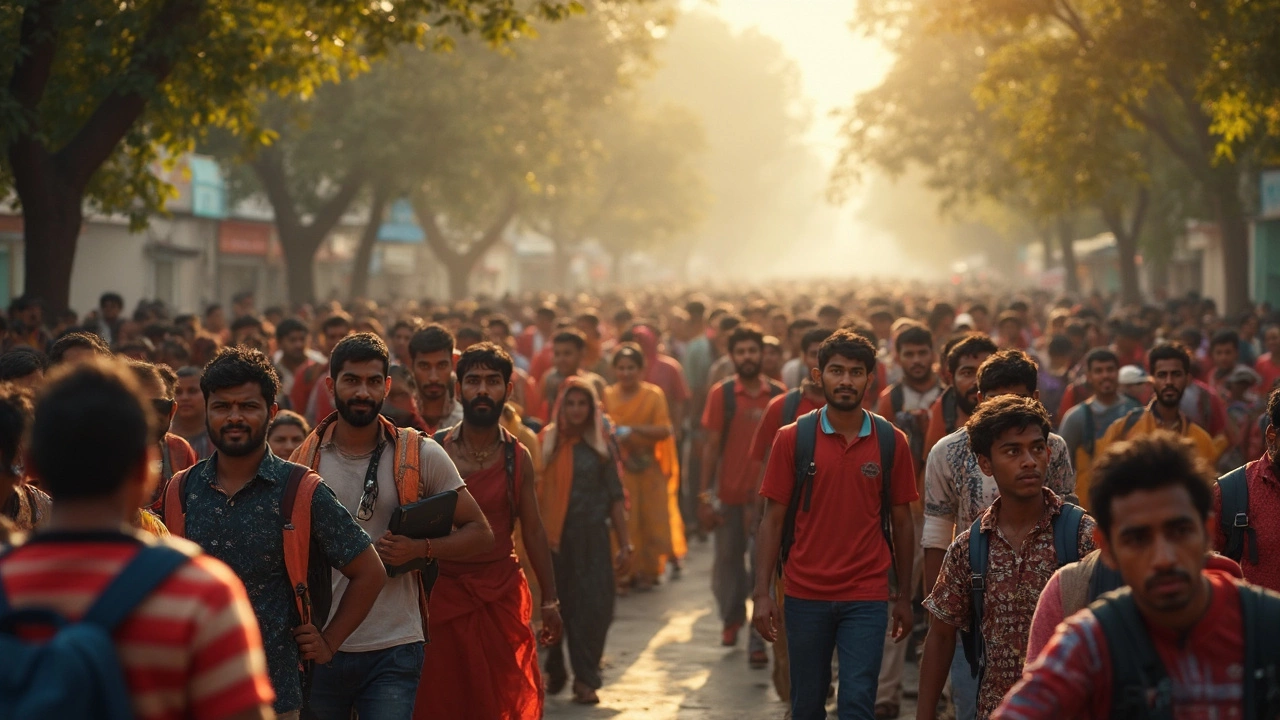A lot of people claim their country's exams are the toughest, but who actually wins the crown? It's not just about how tricky the questions are. Think about it—if millions try, but only a handful make it, the real fight is against the odds more than anything else.
Take a look at India's UPSC Civil Services Exam. Nearly 1 million apply. Only about 1,000 get in. In China, the Gaokao decides your future in a single sweep—students study for years, sleeping barely six hours a night, with some parents moving to cities just for better coaching. In South Korea, the CSAT changes the whole country’s routine; planes don’t fly during listening tests so nobody gets distracted.
People often ask: Is it harder to master a ridiculous syllabus, or to outpace millions of smart, motivated competitors? The answer depends on you, but there’s no denying these “monster exams” ask for years of focus, grit, and sometimes nerves of steel.
- Measuring Competitiveness: What Really Counts?
- Global Giants: UPSC, Gaokao, and More
- Insider Facts: Why These Exams Are So Tough
- Survival Tips: Prepping for the Impossible
- What Success Really Looks Like
Measuring Competitiveness: What Really Counts?
So, what actually makes an exam the most competitive? It’s not just about getting a low score or finishing a long test. There are a few real-world ways to size up competitiveness, and some are more brutal than others.
- Selection Ratio: This is how many people get selected compared to how many apply. If 1 out of 1000 makes it, you know it’s intense. The lower the ratio, the harder it is.
- Number of Applicants: Sometimes the pool itself is massive—like millions trying for a few hundred seats. That’s next-level competition.
- Exam Difficulty: Tough questions? Unforgiving marking? Some exams have both, making it impossible to win by luck or cramming last minute.
- Preparation Time: If people are dedicating years (not just months), you know the bar is sky-high.
Here’s a quick look at some well-known exams and how they measure up:
| Exam | Applicants (yearly) | Seats | Selection Ratio |
|---|---|---|---|
| UPSC (India) | 1,000,000+ | 900-1,000 | ~0.1% |
| Gaokao (China) | 11,000,000+ | Varies | ~2% for top colleges |
| CSAT (South Korea) | 500,000+ | Varies | Super low for top universities |
| US Bar Exam (New York) | 15,000+ | All who pass | ~60% pass rate |
So, when you hear someone say their exam is the hardest, check the numbers. If you land in the 0.1% club, you’ve definitely climbed a pretty steep mountain.
Global Giants: UPSC, Gaokao, and More
If you ever dive into forums about competitive exams, three names always pop up: India’s UPSC Civil Services, China’s Gaokao, and South Korea’s CSAT. Each one shapes entire education systems and careers, and they aren’t just tough—they’re on a whole different level.
UPSC Civil Services Exam (India): More than 1 million people show up every year. The process lasts nearly a full year, with three rounds: Prelims, Mains, and a brutal personality test (a.k.a., the interview round). The odds are wild—last year, only about 0.2% made it through. You need to master everything from ancient Indian history to economics to quirky essays on social issues.
Gaokao (China): Nicknamed “the life-defining exam,” Gaokao is taken by roughly 12 million students every year. For rural kids, it’s the best shot at escaping poverty. But the stress is ridiculous—even hospitals put up silent signs on exam days. One shocking stat: in 2024, over 10 million students sat for Gaokao, but less than 2% got into the top two universities, Tsinghua and Peking.
CSAT (South Korea): Koreans call this the “Suneung.” National TV broadcasts the event. Even businesses open late to let students reach exam centers on time. The funny thing is, employers and the society itself view CSAT results almost like a badge for life. Every November, the whole country literally changes gears for a handful of hours.
Just to put it in perspective, here’s a side-by-side comparison:
| Exam | Country | Yearly Candidates | Selection Ratio | Key Pressure Point |
|---|---|---|---|---|
| UPSC Civil Services | India | ~1,000,000 | 0.2% | Year-long marathon, vast syllabus |
| Gaokao | China | ~12,000,000 | 2% for top universities | Single test, future at stake |
| CSAT (Suneung) | South Korea | ~500,000 | Top scores needed for elite colleges | National obsession, high social impact |
| JEE Advanced | India | ~200,000 (after JEE Main) | 1% for IITs | Extreme competition, tough problems |
| Bar Exam | Japan | ~50,000 | 3-4% | Long prep, ruthless cut-offs |
So, what’s the takeaway? These aren’t just tests—they set the rhythm for millions of families, launching lifelong careers or forcing tough second acts. If you’re thinking about taking one on, don’t just cram facts—understand the pressure, the system, and what you’re really preparing for.

Insider Facts: Why These Exams Are So Tough
People talk about tough tests, but until you see the pressure firsthand, it’s hard to wrap your head around what makes these things brutal. Here’s what separates the competitive exams like UPSC, Gaokao, and CSAT from your regular finals at school—their scale, the pressure, and the stakes are way higher.
First, let’s look at the sheer numbers. More than 10 million students sit for the Gaokao every year. The UPSC in India easily crosses 1 million applicants, and in Japan, nearly 500,000 take the Center Test. But the number of seats or positions? It’s often just a sliver. These exams aren’t just hard because of their questions—they’re hard because you’re fighting against an army of contenders.
Here’s how some of the top exams stack up:
| Exam Name | No. of Applicants (Recent Year) | Success Rate (%) | Duration |
|---|---|---|---|
| Gaokao (China) | 12,000,000+ | ~2 | 2 days |
| UPSC (India) | 1,100,000 | ~0.1 | 1 year (with 3 stages) |
| CSAT (South Korea) | 500,000 | ~2.5 | 1 day |
| Bar Exam (Japan) | 40,000 | ~1.9 | 2 days |
But it isn’t just the numbers. The syllabus? It’s massive. UPSC covers everything from current affairs and social studies to science, history, and law. Students spend anything from two to five years just trying to get ready. Gaokao eats up teens’ social lives—many do extra tutoring, and some high-scoring schools even set up ‘cram camps’ where students study up to 14 hours a day.
On exam day, the pressure is off the charts. One single number can decide your whole future—a score just a few marks short shuts off dream colleges or elite jobs. In South Korea, police give test-takers a ride if they’re late, and shopkeepers will open early just to sell breakfast snacks for anxious students. A tiny slip, one rough night’s sleep, and all the years you spent prepping might come crashing down.
Succeeding in these monster exams isn’t just about brains. It’s about stamina, focus, and the ability to put up with serious stress. Some call it a “marathon of the mind”—and there’s no rest until the results come out.
Survival Tips: Prepping for the Impossible
If you really want to crack the competitive exams everyone dreads, you need more than random late-night cramming. It’s all about getting serious with a game plan—one that actually works under real pressure, not just on paper.
First up, time is your best friend and your worst enemy. Toppers from UPSC and Gaokao say the real trick is making a rock-solid schedule and sticking to it. No one’s memory is perfect, so break down that monster syllabus into chunks and assign days to each topic. Don’t bother with ten-hour blocks that fry your brain. Instead, study in 2-3 hour bursts, take short breaks, and get back at it. Research on spaced repetition shows you’ll remember more this way.
Don’t ignore practice tests. Mock exams can make or break your prep. In India, successful UPSC candidates like Tina Dabi solved hundreds of mock papers before attempting the real thing. Mock tests show you where you suck and where you shine—so there’s no excuse to skip them. Always review your answers, especially your mistakes.
Don’t get stuck in solo mode either. Even if you’re an introvert, group study helps. Explaining topics to others can clear up what you thought you knew but didn’t. Also, if you’re prepping for anything with current affairs (like Civil Services), make daily news a habit. Half an hour with a quality news source or a reliable summary goes a long way.
Finally, don’t burn out. Pulling all-nighters once a week isn’t “hard work”—it’s self-sabotage. Top ranks in major global exams come from people who sleep well, eat decent food, and take off at least a couple of hours every week. You can't ace a battle if your mind and body are wrecked.
- Stick to a daily schedule and adjust it as you track progress.
- Switch up subjects to avoid boredom and stay sharp.
- Use high-yield books and cut out useless resources. Less is more.
- Make a habit of analyzing your mock test mistakes instead of just scoring them.
- Take care of your health—good sleep, food, and downtime boost brainpower.
What works for one person might not click for you, so experiment early and be ready to adjust. The people who land those coveted ranks aren’t usually geniuses—they’re just good at building and sticking to the right habits.

What Success Really Looks Like
Cracking one of the world’s competitive exams sounds like getting a golden ticket—instant respect, a great future, big responsibility. But the reality? The journey just starts after you see your name on that merit list.
Let’s get real about the numbers and what happens next. Here’s a quick look at actual stats from top exams:
| Exam | Applicants (Yearly) | Selection Rate |
|---|---|---|
| UPSC (India) | ~1,100,000 | 0.2% |
| Gaokao (China) | ~12,000,000 | Varies: Top 2% make it to elite universities |
| CSAT (South Korea) | ~500,000 | Top 1% reach SKY universities |
So, what does it feel like when all the dust settles? For many, the shock is that success isn’t just about the exam itself. Sure, you earn bragging rights and a shiny new job offer or college seat. But there’s loads of pressure to keep performing. Civil servants from the UPSC, for example, still train for over a year and are expected to solve real problems for millions. Top Gaokao scorers land in China’s best universities but then face cutthroat competition again in college.
One thing’s universal—most top scorers stayed consistent, managed stress, and never let failures or setbacks kill their confidence. Want to actually make it? Focus less on scores and more on building a routine you can stick with for months (or years). Talking openly about burnout, getting help when you slip, and always having a backup plan—these are smarter moves than cramming all night for months.
- Ask past toppers about their journey, not just their marks.
- Find a solid mentor who understands the pressure, not just the syllabus.
- Celebrate each small win to keep morale high. The exam is a marathon, not a sprint.
- Practice mock tests in real exam timing to beat anxiety.
Scoring among the top is impressive, but the habits you build for these exams? That’s the real edge you take into life, long after the results come out.

